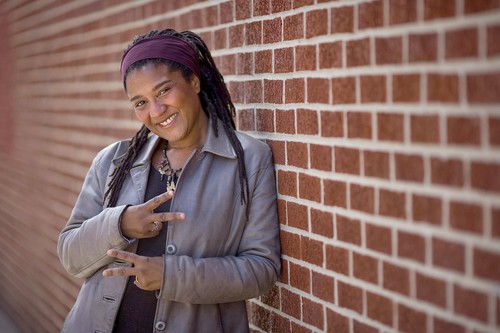Omoze Idehenre and Manoel Felciano in American Conservatory Theater’s The Caucasian Chalk Circle. Photo by Kevin Berne
Theater is musical even when it’s not necessarily musical theater. At the very least, you’re likely to hear music in the lobby before and after the show or at intermission. People sing on stage, even in plays, and what’s a blackout without some sort of music or soundscape with which to accompany it?
My point is that theater and music are deeply and inextricably linked. Two ends of the show music spectrum played out this week in San Francisco.
At American Conservatory Theater, directory John Doyle – best known for his Broadway revivals of Sondheim (Sweeney Todd, Company) in which the actors double as the orchestra – applied his talents to a new translation (by Dominique Lozano) of Bertolt Brecht’s The Caucasian Chalk Circle. On what you might call a “garbage set” (think Cats meets Rent), he stages a sort of wartime, apocalyptic version of the Judgment of Solomon as filtered through Brecht’s epic theater.
What’s most interesting about this play is Doyle’s use of music. You’d never call this a musical, but there’s an awful lot of music. San Francisco composer Nathaniel Stookey has created a sound that is part choral blast, part solemn chant. New ACT core company member Manoel Felciano does most of the heavy vocal lifting as the de facto narrator, and his superb voice serves the score well.
Stookey’s score – at turns accompanied by the occasional accordion, guitar or violin – never lets loose and fully engages singer and audience. This is Brecht, after all, with the theater of alienation and all that. Also, to reach that kind of musical apex would veer more directly into full-fledged musical theater.
The traditional show tune, to put it rather crudely, allows for full release.
Caucasian Chalk Circle takes us close but not all the way. That somehow makes this enterprise seem a more serious way to serve both Brecht’s (and Doyle’s) vision of a wartime parable.
For full-on show tune release – and then some – we had to wait until Saturday night’s performance of Forever Broadway at the Herbst Theatre.
The latest from emerging impresario John Bisceglie, who made a splash with the SF Follies, Forever Broadway was a show-tune lover’s haven and pure hell for anyone else. Here’s the general overview: three hours; a cast of 80; nearly 90 songs. If you left Caucasian Chalk Circle feeling musically frustrated, you left Forever Broadway feeling overstuffed. Director/producer Bisceglie does things on a grand scale, and this show is a lot of fun. But it’s also a little much, even for a show-tune fanatic like me.

The first act has the slickness of a really good high school show choir or a better-than-average cruise ship revue. More than 50 songs are crammed into about 80 minutes, with singers and dancers hustling on and off the stage like they’ll be penalized for lingering (or at least mowed down by a horde of black-clad backup singers, which could actually happen).
Music and vocal director Frank Johnson’s pre-recorded accompaniment adds to the slick factor but also keeps the evening moving right along. Toward the end of the first act, we start a medley with a fist-pumping ensemble number from Les Miserables, segue to “The Ballad of Sweeney Todd,” make a divergent Sondheim stop for “Broadway Baby” then hustle into the expurgated lyrics of “Greased Lightning” before landing, rather inexplicably, at “Tomorrow” from Annie.
It’s a democratic song selection without any consistent rhyme or reason, but there can be no doubt we hear some wonderful voices. There are also moments of cringing, such as when the inevitable “Memory” pops up with a dancer mimicking feline movements behind the singer.
Act 2 is a definite improvement because Bisceglie lets his singers take the time to connect with the audience and invest more emotion in their songs. Keith Stevenson’s “Some Enchanted Evening” is as sweet a version as I’ve heard, completely free of bombast. And Jason Hite’s musical monologue “If I Didn’t Believe In You” from Jason Robert Brown’s The Last Five Years was one of the long evening’s most memorable moments.
Perhaps not surprisingly, the show that came off best on this show tune-y night was Avenue Q. A suite of that puppet musical’s songs – performed, I might add, completely without puppets by Brett Hammon, Brooke Wallace, Larry Cowen, Daniel Schultz, Chad Benjamin Potter, Lee Achacoso-Haskin and Mandy Wilczynski – was funny and sweet. Suzanne Henry worked the audience with Stars and the Moon (another Jason Robert Brown charmer), and Désirée Goyette showed off a dazzling voice on “Gold,” an unfortunately mediocre Frank Wildhorn song from Camille Claudel.
Bisceglie and his gargantuan cast will reprise the show March 21 at the Herbst (3pm). Tickets, as they were on Saturday, are $25, which is a bargain when you consider how many singers and songs you get for your entertainment dollar.
With Bisceglie’s stage full of talent, I couldn’t help longing for a celebration of the great American show tune that re-cast favorites in a new light and exposed hidden gems that should have stopped their original shows but never got the chance. Maybe that will be the ever-enterprising Bisceglie’s next extravaganza.
Here’s a video taste of Biscgelie’s Forever Broadway. Perhaps I don’t have to mention this, but it’s kinda long.
FOR INFORMATION
American Conservatory Theater’s The Caucasian Chalk Circle continues through. Call 415 or visit www.act-sf.org for information.
Forever Broadway returns March 21. Visit www.foreverbroadwaysf.com for information.



